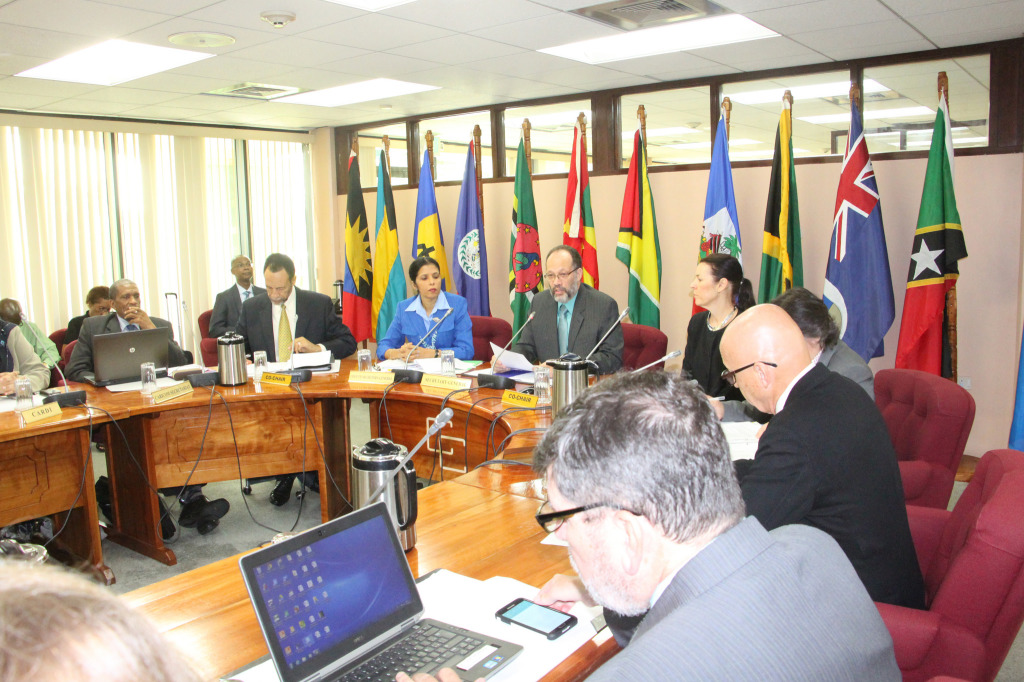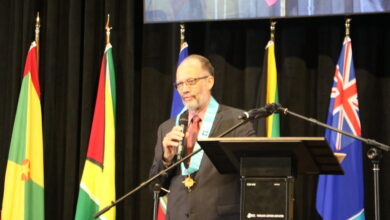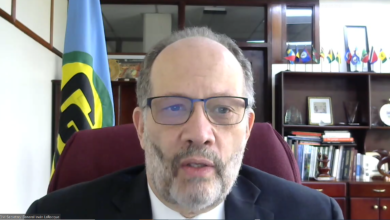It is my pleasure to welcome you all to the CARICOM Secretariat on the occasion of the Eighth General Meeting of the Caribbean Community, its Associate Institutions and the United Nations (UN) System.
A look at the overview of our co-operation reveals an impressive range of areas covered to assist the Community in its development efforts. I want to thank the UN and its Agencies for their support and look forward to the strengthening of our co-operation.
The evaluation of the coordination mechanism for the UN’s assistance to the Region is critical to ensure that it makes our partnership more efficient and effective.
An important occurrence since our last Meeting, with relevance to the thrust of our on-going co-operation, is the adoption by the Community of a Five-Year Strategic Plan for the period 2015-2019. This Plan is aimed at repositioning the Community and focusses on specific priorities.
This Meeting will touch on several of the eleven (11) high-priority areas identified by the Community for focused implementation.
The Plan envisions that effective partnerships will be instrumental in its success. It was most welcome therefore that the UN Secretary-General, His Excellency Ban Ki-Moon highlighted, the need to strengthen partnerships when he addressed the High-Level Dialogue held earlier this month in Barbados. During today’s Meeting, it is hoped that the existing partnership could be further refined in line with the priorities in the Plan.
Colleagues, this Eighth General Meeting is of particular importance, as 2015 sees heightened global engagement on development issues of critical concern to us all. It is a year of high expectations.
Already, the Addis Ababa Action Agenda was agreed on last week at the Third International Conference on Financing for Development (FfD3). This I hope will set the tone for successful outcomes later this year for the Post-2015 Development Agenda and the UN Framework Convention on Climate Change (UNFCCC).
The global community has a unique opportunity, presented by these processes, to advance the development of Small Island Developing and Low-Lying Coastal States (SIDS). The inclusion of recommendations put forward in the Samoa Pathway is an important and necessary step in that regard.
The recognition in the Addis Action Agenda of the diverse and specific development needs and challenges faced by SIDS, most of which are middle-income countries, to achieve sustainable development is an encouraging sign for our Community.
I want to highlight one specific issue in that regard. Designation of all our Member States, except Haiti, as middle-income countries, based on the narrow and unique criterion of per capita income has resulted in reduced access to concessional development financing.
Such financing is much needed to address our formidable developmental challenges such as small size, inherent vulnerabilities, susceptibility to exogenous shocks, and a lack of resilience. It also includes the high levels of indebtedness of CARICOM Member States, a significant portion of which is due to those shocks and reconstruction requirements after natural disasters.
I reiterate my call made in Addis Ababa last week for strong collaborative action among the Development Partners, such as the UN and its Agencies, the International Financial Institutions, the OECD, and the Commonwealth, to address urgently the criteria for access to concessional financing and the issue of debt, within a strengthened FfD framework. This is most necessary in order for SIDS, including CARICOM countries, to achieve the 17 Sustainable Development Goals (SDGs) under the Post-2015 Development Agenda.
I recognise the work done by the UNDP in this regard, and I am of the view that the UNDP is well poised to co-ordinate this process going forward.
With respect to the debt issue, the UNECLAC has put forward a worthy proposal that warrants the consideration of the international community and development partners. It recommends the conversion of multilateral and bilateral debt into special funds to address external economic shocks, natural disasters, and education, among other things.
Any discussion on the sustainable development of our Region must be conducted in the context of our adaption to and mitigation of the effects of climate change. For us, Climate Change is an existential issue. We urge therefore that the peculiar circumstances of SIDS, relative to the effects of Climate Change, be recognized adequately by the UN system in their reports. SIDS lack the capacity to adapt to the current pathway of greenhouse gas emissions, which is reported to be leading to global warming of about 4 degrees centigrade. Anything above 1.5 degrees centigrade is detrimental to our Region. There is a need, therefore, for assistance both in advocacy and capacity building.
One of the Community’s most immediate and complex threats to its sustainable peace and socio-economic development is transnational organized crime, and in particular, the illicit drug trade which is integrally linked to the illegal arms trade. The Community played an active role in securing the adoption of an Arms Trade Treaty (ATT) by the UN, to regulate the trade. We welcome the agreement between the relevant agencies of the UN System and CARICOM IMPACS to assist in the implementation of the Treaty.
You will no doubt recall the role of the Community in highlighting the issue of Non Communicable Diseases (NCDs) globally, leading to the High Level Summit of 2011. NCDs continue to be a significant cause of concern in our Region and we urge that actions be taken to support the objectives outlined in the Outcome Document of the Summit. We look forward to the completion of the review currently underway of achievements of the targets agreed upon in that document.
Before I close, I would like to focus our attention on an escalating humanitarian crisis on the border between the Dominican Republic and our Member State, Haiti. The situation is assuming alarming proportions. The human rights of those Dominicans of Haitian descent, rendered stateless, and the Haitian migrants must be respected and protected. We are aware of the efforts being made to assist but much more needs to be done to avert a full-blown crisis.
This requires on the ground monitoring of the situation, which has been called for by CARICOM Heads of Government. We therefore welcome the initiatives of the UN, its Agencies and partners, on the ground in the Dominican Republic and Haiti to put in place monitoring systems
In conclusion, I wish to express appreciation for the United Nations’ continued support to CARICOM’s regional integration and development process. As part of our commitment to achieve sustainable growth and development, we have implemented many initiatives and will continue to do so. But these goals cannot be achieved alone.
It is anticipated that the results of today’s session will identify concrete areas of co-operation that yield tangible benefits in areas of priority to the citizens of the Caribbean Community. I am confident that we will have a fruitful and productive meeting.
Thank you.





